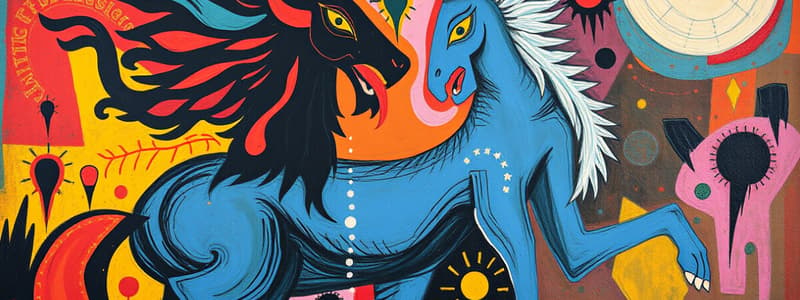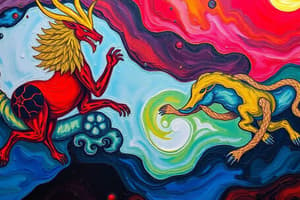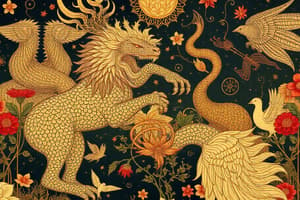Podcast
Questions and Answers
Which of the following is NOT a characteristic of a myth?
Which of the following is NOT a characteristic of a myth?
- Myths are always factual accounts (correct)
- Myths contain elements of magic
- Myths include human-like emotions in gods
- Myths explain natural phenomena
Mythology refers to a set of stories associated with a specific group or culture.
Mythology refers to a set of stories associated with a specific group or culture.
True (A)
What purpose does mythology serve in relation to human behavior?
What purpose does mythology serve in relation to human behavior?
To explain human behavior
Myths often feature _______ who exhibit superhuman traits.
Myths often feature _______ who exhibit superhuman traits.
Match the types of myth with their descriptions:
Match the types of myth with their descriptions:
What is a common purpose of mythology?
What is a common purpose of mythology?
All myths contain violence and punishment of evil.
All myths contain violence and punishment of evil.
Name one function of a myth.
Name one function of a myth.
Which type of folkloric literature is specifically characterized by the presence of royalty and magical lands?
Which type of folkloric literature is specifically characterized by the presence of royalty and magical lands?
A fable typically features human characters rather than animals.
A fable typically features human characters rather than animals.
Name one of the key insights from Jungian Psychology.
Name one of the key insights from Jungian Psychology.
Myths are a symbolic projection of people's ________, values, fears, and aspirations.
Myths are a symbolic projection of people's ________, values, fears, and aspirations.
Match the types of folklore with their descriptions:
Match the types of folklore with their descriptions:
Which of the following serves as a therapeutic approach in Jungian Psychology?
Which of the following serves as a therapeutic approach in Jungian Psychology?
Jung's book 'Psychology and Alchemy' was published in 1944.
Jung's book 'Psychology and Alchemy' was published in 1944.
What is the 'collective unconscious' in Jungian Psychology?
What is the 'collective unconscious' in Jungian Psychology?
Flashcards are hidden until you start studying
Study Notes
Definition of Myth
- Myths are traditional stories of unknown origin aimed at explaining historical events, phenomena, or cultural practices.
- They often involve gods, supernatural beings, or heroes, reflecting the imaginative aspects of cultures.
- Symbolic narratives that explain the origins and early histories of groups or cultures.
Mythology
- Refers to the collective myths from a specific culture, detailing gods, demigods, and legendary figures.
- Myths encapsulate folklore—traditions and stories transferred orally within a culture, including legends, folk tales, and proverbs.
Characteristics of Myths
- Designed to explain natural phenomena.
- Often feature multiple gods who possess human-like emotions.
- Involve supernatural magic and transformations.
- Themes of good and evil, with moral consequences; violence is common.
Purposes of Mythology
- To demonstrate transformation or metamorphosis.
- To impart religious or moral lessons.
- To explain human behavior or motivations.
- To entertain through storytelling.
Functions of Myths
- Mystical: Offer insights into spirituality or the divine.
- Sociological: Reflect social norms and structure.
- Cosmological: Address the universe’s nature.
- Pedagogical: Teach lessons or values.
Types of Myth
- Pure Myth: Explains natural phenomena or origins (e.g., Persephone and the seasons).
- Sage Myth: Contains historical elements embellished with narrative detail (e.g., the Iliad, Trojan War).
- Folk Tale/Fairy Tale: Fictional stories meant for amusement, often featuring magical beings and elements.
Types of Folkloric Literature
- Folk Tale: Simple and straightforward; highlights magic and the supernatural.
- Fairy Tale: Set in magical realms and often involves moral characters.
- Legend: Centers on heroic figures or extraordinary events.
- Tall Tale: Exaggerated stories that stretch the truth.
- Fable: Short tales conveying morals, usually with animal characters.
Other Forms of Folkloric Literature
- Includes ballads, folk dramas, proverbs, riddles, and charms.
Mythological Archetypal Approach
- Carl Jung: Swiss psychiatrist known for the concept of archetypes and collective unconscious.
- Jung's notable works include "Symbols of Transformation" and "Psychology and Alchemy," where he explored the human psyche.
Key Insights on Jungian Psychology
- Archetypes: Universal symbols within the collective unconscious that shape human thoughts and behaviors.
- Individuation: A journey towards self-realization and psychological wholeness.
- Jungian Analysis: Therapeutic approach focused on exploring individual psychological narratives and associated patterns.
Important Concepts
- Myths: Serve as symbolic projections of collective aspirations and fears.
- Archetypes: Idealized models from which variations are derived.
- Collective Unconscious: Shared human experiences, perceptions, and longings.
- Mythological and Archetypal Criticism: Analyzes literature through its recurring myths and archetypal themes.
Studying That Suits You
Use AI to generate personalized quizzes and flashcards to suit your learning preferences.




